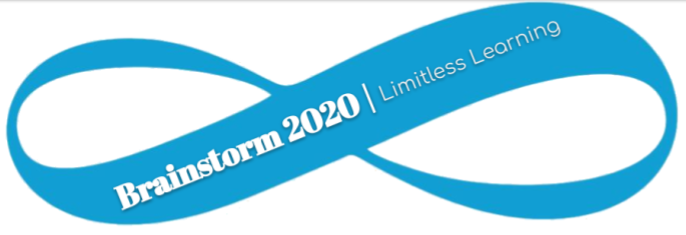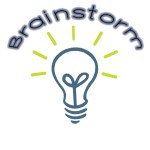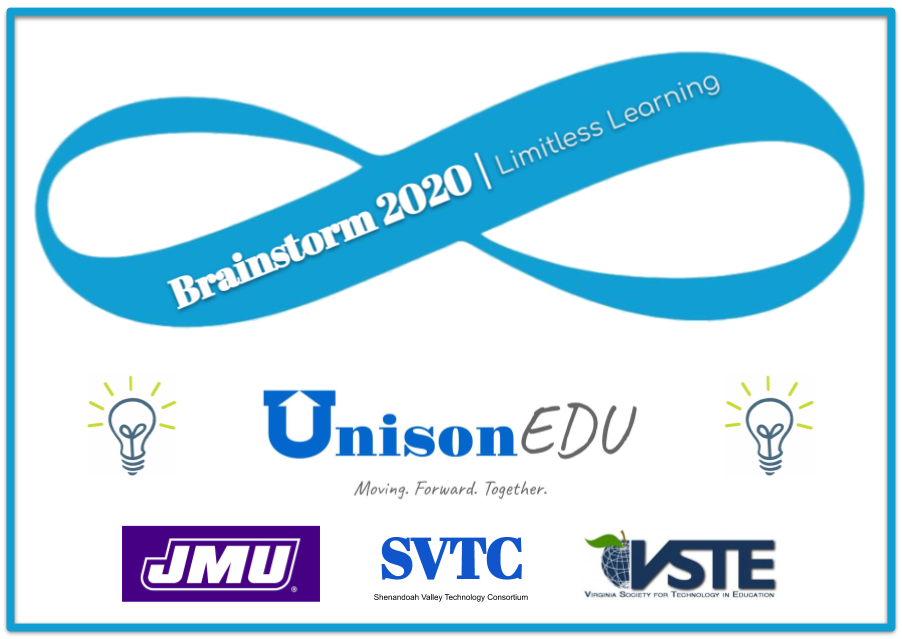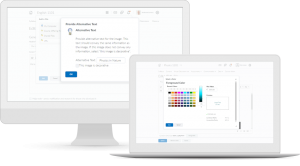The FREE virtual Brainstorm 2020: Limitless Learning Conference is full of over 25 different presenters and sessions. The sessions focus on a tool, concept, or project as well as resources to aid each session in yielding a takeaway that you can implement right away.
Sessions will begin going live the week of April 27, 2020 with new videos each day of the week culminating on May 1, 2020! Spotlight sessions will launch as well featuring Chey Cheney, Katie Fielding, James Lane, Jake Miller, Phil Strunk, & Pav Wander!
Don’t miss the premier FREE professional learning event of spring 2020 all launched from this page.
Be sure to watch as many of the videos as you can. You don’t want to miss the hidden words and your chance to win the grand prize by solving the scavenger hunt anagram! Don’t forget to use the #vstebrainstorm20 hashtag in all your tweets to be eligible for the most conference tweets prize!
A welcome message from Dr. James Lane, State Superintendent of Public Instruction
Monday, April 27
Spotlight
6ft Apart, Lessons from Sick at School (14:50)
For years disabled students have been asking for accessibility accommodations and improvements in homebound learning. Let's take lessons learned in doing remote learning during the corona crisis to inform our practice moving forward in working with chronically-ill students in the homebound setting to provide limitless learning.
Presenter: Katherine Fielding, Woodbridge Senior High School, Prince William County Schools
ABC's and 123's of Google Classroom (38:55)
Transform your elementary classroom to a paperless oasis with the use of Google Classroom and G Suite functions. During this introduction, we will examine the basics of the operating the learning management system and how to personalize it for your use in the classroom. This class will allow hand on experience to investigate and mange Google classroom, as a teacher and a student.
Presenter: Heather Lupton, Technology Integration Coach, Warren County
Google Expeditions: From Consumer to Creator (13:37)
This session will walk you through how to cost effectively use Google Expeditions in the classroom and then will show you how to create your own expedition using Google Tour Creator.
Presenter: Scott Lewis, Instructional Technology Coach, Frederick County Public Schools
Purposeful Planning for iPads in the Classroom (16:11)
How are your PK-5 students using the iPads in your classroom? Are iPads a toy or a tool? Join us as we explore ways to plan for student iPad usage in the classroom. BONUS: Tips and tricks to keep students on task with the iPad.
Presenter: Karen Griffin and Tiffany Cobbs, Instructional Technology Coaches, Newport News Public Schools
Remaining Aloft in the Twitterverse (20:13)
You’ve taken flight and your Professional Learning Network has grown with Twitter. Now you’re ready to take the next steps! In this session, we’ll look at how to become an advanced user by learning about Twitter's filters and analytics, scheduling tweets with third-party apps such as Buffer and TweetDeck, and get the 411 on Twitter Chats!
Presenter: Darcie Priester, Instructional Technology Resource Teacher, Manassas Park City Schools
The Magic Beneath the Surface of EdTech (27:40)
Stop, collaborate, and listen! Do not move away from a technology just because there is a new one and/or without fully exploring the tool. Many times the magic of edtech tools lies beneath the surface and is only discovered after users have explored, failed, and grown. Digging deeper alongside concepts such as “app smashing” creates all new worlds of possibilities! Come learn all about some of the magic beneath the surface of many popular EdTech tools, especially in the land of G Suite!!
Presenter: Patrick Hausammann, Supervisor of Instructional Technology, Clarke County/UnisonEDU/VSTE
Tuesday, April 28
Spotlight
Two Ways to Get Into a Swimming Pool (17:46)
Through story, I encourage people to be more daring and I invite people to reflect on their past and the past I share with them to recall moments of daring and how to recapture those feelings and transfer them to new situations—ones that require daring and creativity. There are two ways to get into a pool- to dip our toes in the water or to leap...
Presenter: Evan Robb, principal, Johnson-Williams Middle School, Berryville
Google Tips and Tricks (27:38)
Google's GSuite is used in many schools and is used well in most cases. This presentation shows you little tips and tricks in order to better use Google at work and at school with your students. Most, if not all of these tricks may help you keep things a little better organized in your classrooms or at least give you new ideas on how to plan lessons.
Presenter: Chad Fisher, Instructional Technology Coach, James Wood High School, Frederick County Public Schools
Awesome Annotations and Note-taking for Digital Natives (36:43)
Learning how to read, take notes and annotate text is an important skill all our students need to truly understand stories, articles, and website. Digital annotation is a skill which our students need to be taught and learned over time to master. Come learn with us all the ways to annotate and take notes on any digital medium such as pdfs, websites, and documents with easy to use and free tools available to you. Annotation has never been this FUN!
Presenter: Joe Marquez, Education Strategist, Sons of Technology
Mixing and Remixing With #GoOpenVA: Ten Ideas for Using OER (24:41)
#GoOpenVA, Virginia's repository of Open Education Resources (OER), offers a wide variety of materials for teachers and students from complete textbooks to individual lesson ideas. Because they are "open," users can use them but also, and here's the powerful part, remix them to meet their specific needs. This presentation will show how remixing can open opportunities for student creativity.
Presenters: Karen Richardson, Executive Director, Virginia Society for Technology in Education; Jean Weller, Virginia Department of Education
Authentic Learning! Technology Can Help With This! (22:05)
Authentic learning helps students understand the real-world connections to what they are learning, they are more likely to be engaged and less likely to question the significance of classroom learning. Technology helps to bridge the gap between the classroom and the real world by providing access to information in a variety ways and through different perspectives. We will look at examples of authentic learning experiences and the way technology can support these experiences.
Presenter: Tim Taylor, Instructional Technology Supervisor, Shenandoah County Public Schools
#AppsDays (38:18)
There are many ways for a teacher to spend the summer and, as many of us know, it often involves a good amount of work. In the summer of 2018, two educators finalized an idea to start classes off in a very different way. #AppDays would start the school year off with relationship building through using #Hyperdocs to learn and use numerous apps such as Canva, Flipgrid, Powtoon, Screencastify, and a second #Hyperdoc focusing on GSuite aka “GSweet.” Come check it out!
Presenter: Phil Strunk, History Teacher, Clarke County Public Schools; Patrick Hausammann, Supervisor of Instructional Technology, Clarke County/UnisonEDU/VSTE
Wednesday, April 29
Spotlight
Educational Duct Tape: an EdTech Integration Mindset (30:43)
In a multi-session, content-rich, idea-filled conference like this one, educators can fall into the trap of “paradox of choice,” which often keeps educators from integrating *any* of their newly learned skills. In this session, Jake will share about how “Educational Duct Tape” can help educators overcome this paradox. Learn how Jake’s silly metaphor can be used as an #edtech integration mindset in your instruction, tomorrow!
Presenter: Jake Miller, Technology Integration Specialist, Orange City School District
Digging into Google Forms (24:07)
This session will show participants the key features of Google Forms and how they can create a variety of activities such as quizzes, Choose your Own Adventure stories and Digital Breakouts.
Presenter: Darcie Priester, Instructional Technology Resource Teacher, Manassas Park City Schools
An introduction to building your own AR Sandbox (11:29)
Have you ever heard of an AR Sandbox? This unique tool provides various opportunities for student learning without the need of special glasses or headsets. The construction of a sandbox also presents an interesting way to promote cross curricular work among various departments as well. Learn how one high school managed to make their own AR Sandbox through cooperation, collaboration, and creativity and how you can make one too.
Presenter: Chad Fisher, Instructional Technology Coach, James Wood High School, Frederick County Public Schools
ThingLink: Making Ideas Pop! (27:57)
Do you have a need to package a presentation for large groups and taught by a wide-variety of trainers? Or do you need to provide a way for students to have independent learning? A ThingLink can be used to create school-wide presentations, an online module, or for a classroom of students. Really -- it's your imagination that will make anything possible!
Presenter: Jennifer Rowan, Director of Technology, Jefferson County Public Schools
Finding Balance and Joy in the Digital Age (29:07)
Join Karen Richardson and Margaret Sisler for a conversation about finding joy and balance in a sometimes overwhelming world. How do we make time for our own well being and deep relationships when we see the work that needs to be done and brings us its own joy? What role does technology play both positively and negatively in finding personal space?
Presenters: Karen Richardson, Executive Director, Virginia Society for Technology in Education; Margaret Sisler, School-Based Technology Specialist, Westfield High School, Fairfax County Public Schools
Leading Your Professional Learning (35:06)
Few tools or software have revolutionized on demand professional learning like Twitter. No teacher, anywhere need feel isolated and unable to seek inspiration, guidance, and collaboration. These powerful components of professional learning are all within the world of Twitter and at the fingertips of any educator.
Presenters: Abby French, History Teacher, Shenandoah County Public Schools; Patrick Hausammann, Supervisor of Instructional Technology, Clarke County/UnisonEDU/VSTE
Thursday, April 30
Spotlight
Rediscover Your Voice! (28:35)
Improving our teaching practices through podcasting! Through this presentation, we'd like educators to come away with the idea that their voices can be heard and rediscovered through so many different mediums, including podcasting, as is the case in our experience.
Presenters: Chey Cheney & Pav Wander, teachers, Beaumonde Heights Junior Middle School, Toronto District School Board
Can I Use This Amazing Resource? (13:57)
Did you find an image from Google images or resource from Pinterest and wonder if you can use it? This session will go over how you can find out if a resource is copyrighted and what you need to do to be able to use it in a Google Slide presentation, newsletter, etc.
Presenter: Rosemary Wagoner, ITRT, Waynesboro Public Schools
Intro to 3D Design with Tinkercad (17:37)
This session will cover the basics of Tinkercad, a 3D modeling software. Come learn how to design a keychain and take home an introductory lesson you can use with your students! All content areas and grade levels welcome - we will briefly discuss how 3D modeling can be used in all classrooms!
Presenter: Megan Hacholski, STEAM Lab Coordinator, Brookfield La Grange Park District 95
Blending in a K-2 Classroom (19:46)
CUE Member and Kindergarten teacher and 2019 CUE BOLD teacher of the year Ben Cogswell is going to share his go-to strategies and awesome mindset of blending amazing pedagogy with easy to access edtech in his #KindRockets classroom. Ben was recently quoted in the NY Times and his SeeSaw lessons have over 100k views. Ben's warm style is inspirational for any grade level.
Presenter: Ben Cogswell, Kindergarten Teacher, Alisal Union School District
Next Level EDU Video with WeVideo and Edpuzzle (Part 1: WeVideo 0:00-18:30; Part 2: Edpuzzle 18:30-42:00)
Learn how to use WeVideo to create teacher-made video content for distance learning. By app-smashing your videos with EdPuzzle, you can assess student understanding and track progress automatically! The skills learned here can be used in all content areas for anyone interested in creating video lessons to push out to students.
Presenters: Jen Leban, Creative Technology Teacher, Elmhurst CUSD 205/Sandburg Middle School; Patrick Hausammann, Supervisor of Instructional Technology, Clarke County/UnisonEDU/VSTE
Is the Sky Even the Limit with the Rubik's Cube? (20:09)
When the Rubik's Cube was invented by Erno Rubik in 1974, it was a wooden prototype with rubber bands for its twisting mechanism. Since then, the Rubik's Cube has caught the attention of many. This puzzle can be integrated in any curriculum to create mosaics, qteach problem-solving skills, encourage teamwork, and spark students' curiosity. Dan Van der Vieren, who spoke about this topic at TEDxBoulder in 2018, will share his successes in the classroom and ideas to take the Cube to the next level.
Presenter: Dan Van der Vieren, Ambassador/Educator, You Can Do The Rubik's Cube
HACKaroni & Cheese: EdTech Hacks & Cheesy Jokes! (29:07)
EdTech Hacks and Cheesy Jokes! This session focuses on little tips and tricks to make your edtech tools (primarily Google for Education tools) do things that you didn’t know they could do! And, yes, along with all of those hacks come plenty of silliness, a.k.a. cheese.
Presenter: Jake Miller, Technology Integration Specialist, Orange City School District
Friday, May 1
Spotlight
What Do You Like? (19:36)
In an unprecedented year we all need words of encouragement and reminders that even in the midst of hard times there are things we do well. Check out this video where Phil Strunk (@MrPStrunk) encourages educators to learn from others, but also recognize that they themselves have talents to bring to the table.
Presenter: Phil Strunk, History Teacher, Clarke County Public Schools
Top 12 Google Extensions (24:44)
Do you use Google Extensions? Want a few more tools for your Google Toolbox? During this session I will share 12 extensions to use with students.
Presenter: Denise Henry-Orndorff, ITRC, Strasburg HS, Signal Knob MS, Sandy Hook ES
Podcasts Are the New Essays (29:25)
In this session you will learn the how-to and whys of bringing podcasting into your classroom. Perfect for all grades and contents.
Presenters: Katie Fielding, Daniel Nemerow, Elizabeth Summers, Billy Watts, Instructional Tech Coaches, Prince William County Schools
Get exSITE-Ed!: Google Sites for Student Portfolios (37:09)
Learn how to leverage the new Google Sites to create an immersive tool for student organization with the creation of an eBinder. The idea behind any binder is organization, primarily collection of work, a place to reflect on their learning process, and finally recollect of what they learned for purposes of sharing or studying. This organizational structure is "Collection,Reflection and Recollection” and will be our guiding principle in our eBinder creation.
Presenter: Joe Marquez, Education Strategist, Sons of Technology
Student Centered Learning: A Conversation with Abby French (44:13)
Few things can have the power to change a classroom for the better like student centered learning. This conversation wit Abby French will give you insight into how to get started, what it looks and sounds like when its working, and examples of the benefits that come with this focus on students leading their learning.
Presenters: Abby French, History Teacher, Shenandoah County Public Schools; Patrick Hausammann, Supervisor of Instructional Technology, Clarke County/UnisonEDU/VSTE
Building Motivation for You and your Students! (17:43)
In today's challenging times it's more important than ever to help students become motivated with their learning. It starts with us! The session will discuss ways to develop a higher level of motivation both in and out of the school environment. While the session isn't grade level specific, it's generally geared more towards a secondary student. All teachers can benefit though.
Presenter: Craig Shapiro, HPE Teacher/Secondary Lead Teacher, William Tennent High School/Centennial School District


 Brainstorm: Limitless Learning Online Conference
Brainstorm: Limitless Learning Online Conference



